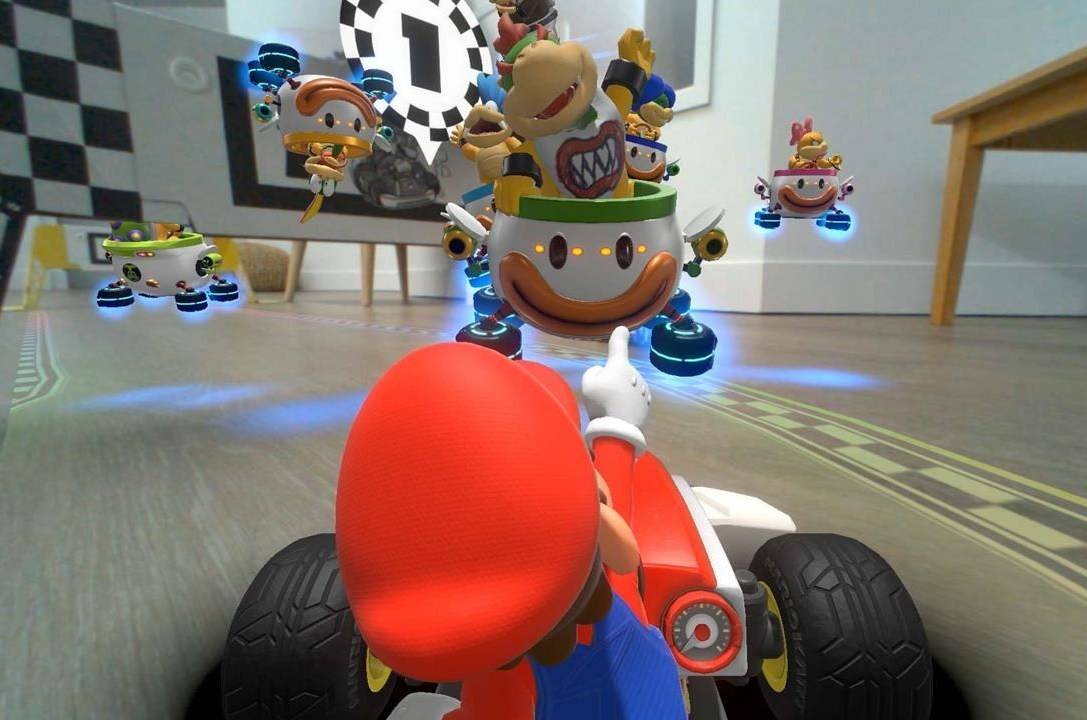The popular Mario Kart series of games has seen the stars of the Nintendo universe race through deserts, haunted houses, ancient temples and myriad other exotic locales.
Next stop? Your living room, provided you have the space to host your own track.
“Mario Kart Live: Home Circuit” is a toy and video game combination that uses a “mixed reality” interactive experience to let gamers set up racetracks in their homes and drive them using their Nintendo Switch consoles.
The kit, which will be released Oct. 16, uses a Switch-controlled Mario Kart toy mounted with a camera to drive through checkpoints and create a track. Players can then drive that course, either in a single-player time trial, against AI opponents or in local multiplayer mode with up to three additional drivers.
The product includes the physical kart, featuring either Mario or his brother Luigi, four gates and a USB charging cable. The four gates serve as the checkpoints for racetrack creation and must all be used when creating a course.
The combination of using in-game tools with real-world objects offers a lot of creative potential when designing tracks. The gates can be customized with a variety of boons and traps familiar to Mario Kart enthusiasts, including items, speed boosts and Thwomps — massive stone blocks that smash down on the track. Courses can be assigned environments which have their own hazards, such as ice blocks that can freeze your cart.
Those digital enhancements can be combined with physical elements to make courses even more challenging. A demonstration video showed a cart plowing through a stack of cardboard boxes on the track, creating a series of hazards for other racers. Creative gamers will no doubt find no shortage of clever uses for everyday household items when making tracks.
If it all comes together, the result should be a classic Mario Kart racing experience boosted by creative input from gamers. So far it looks promising, as the demo showed Mario whipping around a custom course, using items to boost his speed and throw obstacles at opponents and avoiding traps in both the physical and digital realms.
Of course, like a physical toy racetrack, you’ll need some room to set up. At a product demonstration a Nintendo spokesperson recommended an unobstructed space of roughly five square metres to lay out a track, which could be a challenge for those who live in apartments or condos, or in busy environments with a lot of foot traffic.
There are options if space is at a premium. Gates can be used several times per lap, and tracks can cross over each other to add complexity to a compact design. Compact tracks would need some pretty tight turns, so the toy kart would likely have to run at one of the lower available speed settings.
There is also the issue of price, especially with multiplayer races. The manufacture-suggested retail price of the kit is $129.99 — about $50 more than the average price of a newly released triple-A video game — and each player must have their own kart and their own Switch to participate. The software component of the product is free to download.
Also, as a physical kart is needed to play, there is no online connectivity. So in the product’s current state, it’s not possible to create a track then share it over the Internet with a friend.
While space and price are potential issues, “Mario Kart Live: Home Circuit” should deliver an intriguing experience to fans of the series. It remains to be seen how seamlessly the physical and digital products coexist, but the potential is there to satisfy kart racers and track builders alike.
Curtis Withers, The Canadian Press

